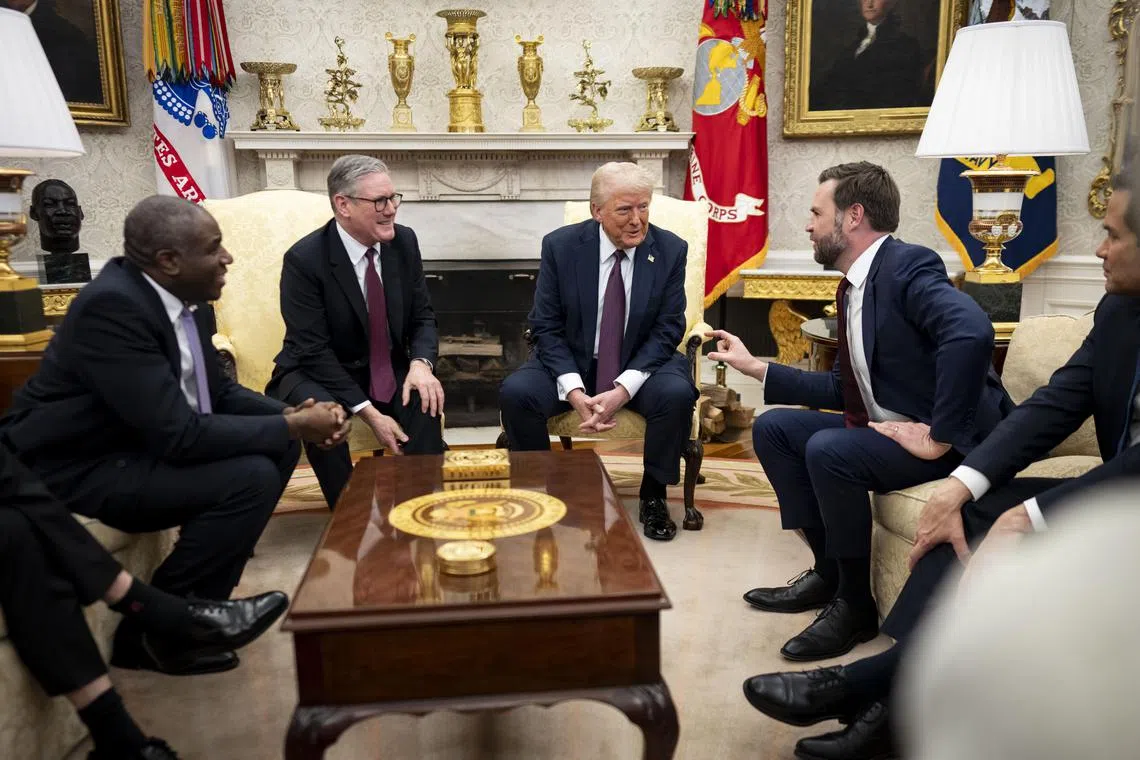Trump dodges plea from Britain’s Starmer for Ukraine security guarantee
Sign up now: Get ST's newsletters delivered to your inbox

(From left) British Foreign Secretary David Lammy, British Prime Minister Keir Starmer, US President Donald Trump, US Vice-President J.D. Vance and US Secretary of State Marco Rubio at the White House on Feb 27.
PHOTO: NYTIMES
Follow topic:
WASHINGTON – President Donald Trump said on Feb 27 that a minerals deal with Ukraine is the security guarantee Kyiv needs against Russia, brushing aside a plea from British Prime Minister Keir Starmer for a commitment of US military support.
Mr Starmer, who was meeting Mr Trump at the White House for the first time since the US leader started his second term, turned on the charm, saying peace in Ukraine had become possible only because of Mr Trump.
Mr Starmer also delivered an invitation from King Charles for a future state visit
But underlying differences between the allies remained, including transatlantic frictions over US-Russia talks aimed at ending the Ukraine war, and Mr Trump’s tariff threats.
Before the meeting, Mr Starmer had said there could be no long-term peace in Ukraine without firm US security guarantees
“We are a backstop because we’ll be over there, we’ll be working” as a result of the economic partnership, Mr Trump said. “We’re going to have a lot of people over there.”
Asked whether he could trust Russian President Vladimir Putin, Mr Trump said, “trust and verify”, echoing former US President Ronald Reagan’s views on negotiations with the Soviet Union.
He said he did not think Mr Putin, who organised invasions of Ukraine in 2014 and 2022, would do so again after a deal. Talks towards such a compact were moving briskly, he said.
“It will either be fairly soon, or it won’t be at all,” Mr Trump said.
Mr Starmer said not just any deal would do, underscoring the concern among European nations that a rushed peace deal with Russia might lead to further instability in Europe.
“We have to get it right,” he said at a joint press conference with Mr Trump. “It can’t be peace that rewards the aggressor.”
Shocking allies
Mr Starmer is the latest European leader to meet Mr Trump after French President Emmanuel Macron’s visit to the White House on Feb 24 for a friendly encounter
Mr Trump, who came into office on Jan 20, has shocked traditional US allies in Europe by drawing closer to Mr Putin, calling Ukrainian President Volodymyr Zelensky a “dictator”,
On Feb 27, Mr Trump distanced himself from the dictator comment and said he gets along with the Ukrainian leader.
Mr Zelensky is expected to be in Washington on Feb 28
Mr Starmer has signalled that Britain will increase defence spending

US President Donald Trump holding a letter presented to him by British Prime Minister Keir Starmer (left) from Britain’s King Charles III, in the Oval Office of the White House on Feb 27.
PHOTO: AFP
On Feb 27, Mr Trump reaffirmed the United States’ long commitments to the mutual defence of Nato nations even if European peacekeepers end up in Ukraine, saying: “I support it. I don’t think we’re going to have any reason for it.”
Mr Putin on Feb 27 warned “Western elites” against trying to sabotage a potential rapprochement between Russia and the United States, saying Moscow would use its diplomats and intelligence services to thwart such efforts. The remarks were an apparent reference to the European Union and Britain.
Mr Starmer has said he is open to British troops providing security guarantees to Ukraine but only alongside other European nations and with “the right conditions in place”.
European countries are concerned about the high level of conflict in Ukraine now, a US official said, while a ceasefire would give them more comfort that their role is more about peacekeeping than deterring active conflict.
Trade talks
Mr Trump has shattered policy norms since the start of his second term, rattling allies by advocating for US ownership of the Gaza Strip
During the joint press conference, Mr Trump said the US and Britain were negotiating a bilateral trade agreement.
A wide-ranging free trade deal has eluded the countries since Mr Trump’s 2017 to 2021 term in office, but the US President said the two countries could reach a deal “very shortly”.
Asked by a reporter whether Mr Starmer had convinced him to abandon threats to impose tariffs on Britain, Mr Trump said: “He tried. He was working hard, I’ll tell you that.”
“We could very well end up with a real trade deal where the tariffs wouldn’t be necessary,” Mr Trump said. “We’ll see.”
At the start of the visit, US Vice-President J.D. Vance said the leaders also were discussing what he described as “infringements on free speech” in Britain that have affected American technology companies.
“We’ve had free speech for a very, very long time in the United Kingdom,” Mr Starmer responded.
The British leader took care not to be drawn into any criticism of Mr Trump. The US President also dished out compliments.
“You’re a very tough negotiator,” Mr Trump said, drawing laughter from Mr Starmer. “I’m not sure I like that.” REUTERS

